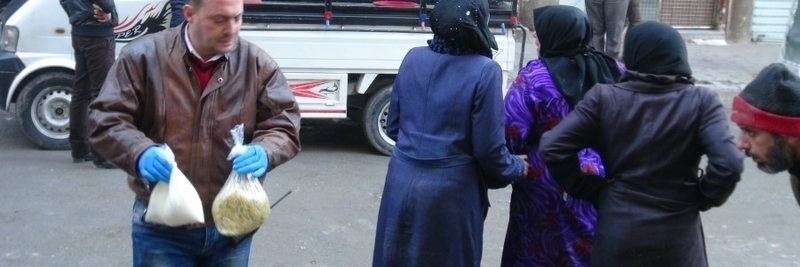Many young men had taken to carrying weapons to protect demonstrators from government forces. The protests and mass funeral processions went on for six months, during which time our love for the armed men grew. We welcomed them among us, and chanted, “Long live the Free Syrian Army” when we saw them. It was a slogan we rejoiced in.
The young men enjoyed the attention. They were proud of their good looks, proud of their weapons, and proud of the fact that they were protecting us. When they thought we weren’t looking, they would steal glances at the women, but we noticed and it felt good to see them smile.
Mothers who saw their sons at the protests would gaze proudly upon them, their eyes welling up with tears. These young men were members of the Free Syrian Army, and most of them no longer lived at home for fear of being arrested by the government.
Some of them hid out on farms on the outskirts of the city, while others lived in vacant houses that belonged to friends or relatives. None of them slept in warm beds or ate hot meals.
It was during this period that the idea of opening a kitchen to cook for these men came to me. I was inspired by my friend Kifah, who told me she was sending cooked meals to her son and the men he lived with.
I started cooking for the men I knew. One day, when both I and someone else delivered food to the same group, I decided to organise things.
At the time, I worked for a charity called Rohama Baynahom (“Merciful Towards Those They Live Among”) and visited the families of martyrs, detainees and the poor. I gathered information about numbers, their financial situation and health, and I worked with a group of colleagues to create a schedule to ensure we distributed food fairly.
My sisters and I took on responsibility for cooking for two groups daily, but I began to struggle to cover the costs of foodstuffs. Friends and relatives came to my aid. My elderly aunt Umm Rami, may her soul rest in peace, would give me money, saying, “I can’t help you with the cooking, so take this money and buy the ingredients you need.”
My friend Umm Salum once asked me to drive by her house, and when I got there she emptied the contents of her fridge into large bin bags for me. The food included tomato paste, margarine, oil, lemon juice, peas and okra. As I was leaving, she handed me a large sum of money, saying, “Buy some meat and chicken to cook with the food.”
Another friend told me, “I have vowed to God to sacrifice a lamb, and I’ll have it cut up at the butcher’s and delivered to you.”
Many other women in Idleb did the same kind of work I was doing, and together we made plans to bake a giant cake on the first anniversary of the revolution. We were hoping to set a Guinness world record.
On March 10, 2012, however, government troops entered Idleb city and we were forced to put the project on hold. The young men we cooked for fought against army tanks. Some of them were martyred, and others left Idleb to fight in nearby villages.
I have fond memories when I look back at those days. We chose to cook the most complicated dishes for the young men – stuffed vine leaves, stuffed vegetables and samosas. I have been told that the food I cooked back then was tastier than anything else I have ever made. Perhaps it was the fancy ingredients like nuts that I added, perhaps it was the large amounts of meat I used, or perhaps it was the love I poured into preparing the meals.
Desserts were the dishes I made which I know the young men liked best. They would send words of gratitude to me through my daughter, when she visited them. “Is your mother the cake lady? Yum! The food and desserts she makes are so good!” they would say.
Some day soon, God willing, I will resume our project and bake them a Guinness record-breaker of a cake.
This feature was republished by the Syrian Observer at the approval of Damascus Bureau.


